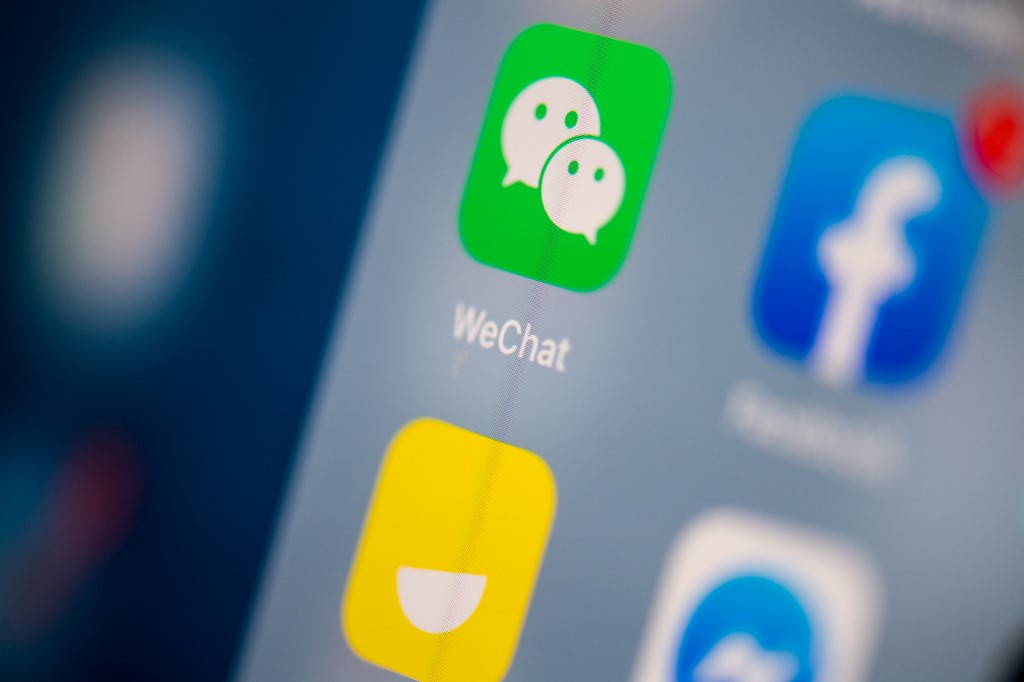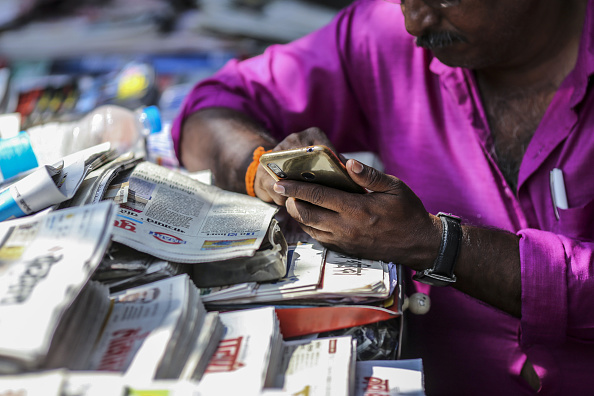
This illustration picture taken on July 24, 2019 in Paris shows the logo of the Chinese instant messaging application WeChat on the screen of a tablet. (Photo: AFP)
The "2,000 years of unbroken friendship" between the two neighboring countries, India and China, have become increasingly toxic with the third round of ban on Chinese apps by the Indian government under Prime Minister Narendra Modi instead of promoting healthy and stable development of India-China relations, which is the need of the hour.
Amid the ongoing standoff between Indian and Chinese soldiers at the Line of Actual Control (LAC) in Ladakh region of the undefined China-India border, on November 24, the ruling Indian government banned 43 more Chinese apps include some prominent names like AliExpress, Snack Video, and Lalamove India, citing the previous orders that these apps are engaged in activities "which are prejudicial to sovereignty and integrity of India, defense of India, the security of state and public order", according to a press release by India's Union electronics and information technology ministry.
Without hesitation, it can be said that the latest round of ban on major Chinese apps and games is the Modi government's calculated plan to spit venom on China in the country. Modi's antagonistic stance towards China may charm the fans of his Bharatiya Janata Party (BJP), or it may have brought him closer to his "big friend" U.S. President Donald Trump, but such type of dangerous nationalistic sentiments will only score a same-side goal since blocking access to Chinese mobile apps, and boycotting chorus against Chinese goods will negatively impact the India-bound investments.
As per media reports, China's retail giant Alibaba-owned AliSuppliers Mobile App, Alibaba Workbench, AliExpress - Smarter Shopping, Better Living and Alipay Cashier, were among the 43 applications whose access had been blocked. 15 Chinese dating services and live-chatting apps were also on the banned list. It should be noted here that on June 29 this year, a total of 59 Chinese apps, including the hugely popular TikTok, WeChat, Weibo and Camscanner, were banned by the Modi government in the first phase. Later on September 2, India banned 118 more apps, including popular gaming app PUBG. The total number of Chinese apps banned in India now stands at 220.
Many Indian experts on foreign relations, as well as opposition leaders, believe that since Modi has been losing his popularity among the Indian masses due to his administrative failure of handling the COVID-19 pandemic, he is now cunningly using anti-China sentiment in the country to garner political weather in his party's favor. There is little doubt that the Modi government's ban on Chinese apps on the pretext of "national security" is just a show.
It's a matter of regret that after becoming the Prime Minister of India in May 2014, Modi has spared no effort to project China as an enemy country before the Indian public. And his China- animosity is evidenced by his working closely with America to contain China under the frame of Indian-Pacific strategy, restricting Chinese investments, exaggerating military activism on the India-China border, portraying China as an "expansionist nation", openly supporting the U.S. against China in the South China Sea or advocating the words of President Trump for the COVID-19 outbreak.
Undoubtedly, all these activities of India have significantly damaged the Sino-Indian relationship and, of course, go against the spirit of the 1954 "Panchsheel Treaty" that has been guiding the bilateral ties over the years.
Highlighting the Doklam crisis in 2017 and the death of twenty Indian soldiers in the June 15 Galwan Valley clash with the Chinese army, several ultra-nationalist Indian politicians of the ruling BJP, some right-wing Hindu nationalist organizations as well as a section of the IT industry have urged the government to be more stringent against China by banning the Chinese apps in the country. The Rashtriya Swayamsevak Sangh (RSS), the Swadeshi Jagran Manch (SJM), the Confederation of All India Traders (CAIT), all are linked to the ruling BJP, have been trying to incite Indian citizens into boycotting Chinese goods, responding to Modi's much-hyped call for an "Aatamnirbhar Bharat" (a self-reliant India).

A vendor uses a smartphone while waiting for customers at a newspaper stand in Mumbai, India, on Saturday, February 15, 2020. (Photo: Getty)
Even the two Indian companies Policy Bazar and MobiQuick, have urged the government to seek the protection of the interests of domestic companies against the monopoly of Chinese investors in the Indian startups market. Interestingly, the Policy Bazar, which has received huge investments from Tencent Holdings of China, is asking for controlling Chinese investments in the Indian IT sector.
Undoubtedly, the self-reliant India campaign is a brave idea, but an unwise move since boycotting Chinese products or blocking Chinese apps is not a solution to the boundary disputes. Prime Minister Modi and his administrative officials should always bear in mind that India is not the U.S., Japan, ASEAN, or the EU. India, with its weaker economy, power, and strength, can hardly compete with China, which has been India's largest trading partner with a cumulative investment of more than 8 billion U.S. dollars in India, source of imports, and fourth-largest export market.
Over the years, cost-effective Chinese products such as mobile phones, household appliances, lighting, and electric fittings, infrastructure, automobile parts, and medicine have helped to keep prices low in the Indian market, thereby helping the Indian consumers.
The hard reality is that in order to crush the economic backbone of China after the border confrontation, the Indian government, with its restrictive measures on Chinese apps by violating market rules and laws as set out by the World Trade Organization (WTO), has actually punished its own citizens. The ban of TikTok and other Chinese apps hurts the livelihood of millions of Indians. A sense of utter hopelessness is rightly reflected in the words of an Indian maid: "With the TikTok ban, the government has pushed the poor family to the gallows. As if lockdown wasn't enough!"
Plainly speaking, the Modi government is losing the gamble by boycotting Chinese goods or banning Chinese apps instead of finding a way of diplomacy to deal with China over the border dispute. There is no doubt that Chinese investment has been playing a crucial role in the Indian government's "Made in India" initiative. Since the ongoing COVID-19 pandemic has severely affected India's economic and social development, the country badly needs Chinese investment to accelerate its economic growth. But the Indian government's move has significantly reduced Chinese investors' presence in Indian startups' deal flows.
All along, China has shown its goodwill to work with India. As such, it is hoped that India, under the Modi government, should not erect the "Great Wall" against Chinese investment in its market. The time has come for India to be a partner with China through trade and investment in the post-COVID era instead of attempting to completely exclude "Made in China", which is not good for India. The India-China ties shouldn't be a "knockout" or a "zero-sum game" in the era of globalization.


